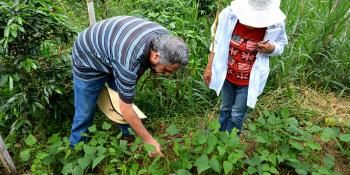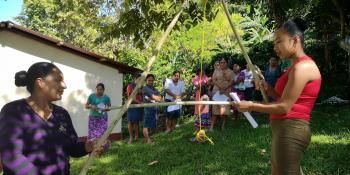Building evidence on the benefits of climate-smart agriculture
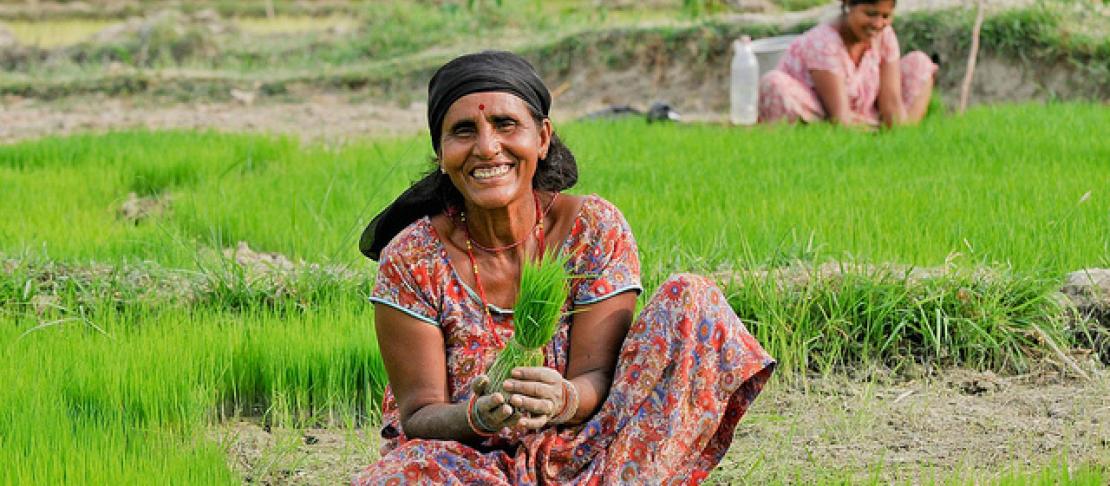
CCAFS South Asia is working with Practical Action Consulting, Nepal, to highlight the benefits of climate-smart agriculture among farmers through trainings and visits to demonstration plots
CCAFS South Asia together with Practical Action Consulting, Nepal, are working with farmers and the private sector to implement climate-smart agriculture interventions in the production of rice, maize and sugarcane.
A package-of-practices (PoP) focused on climate-smart agriculture interventions for the selected crops have been put together for demonstration plots in farmers’ fields and in private agricultural firms. Inspired by the model of climate-smart villages, a project led by CCAFS South Asia in India, Nepal and Bangladesh, these demonstration plots aim to involve the private sector in scaling out climate-smart agriculture and managing climate risks in the production of key crops.
An aim to train 15,000 farmers
Training farmers on climate-smart agricultural practices and technologies is an integral component of this pilot project. The project aims to train 15,000 local farmers on climate-smart agricultural practices and technologies. These farmers would then inspire other farmers to follow suit by adopting climate-smart agriculture practices.
Since the onset of the project last year, 2,112 farmers have been trained (1,010 sugarcane farmers and 1,102 rice farmers) and 32 demonstration plots (12 in sugarcane and 20 in rice) for climate-smart agriculture interventions in sugarcane and rice have been established.
Similarly, private sugarcane firms (Eastern Sugar Mill-Golchha Organization) and rice firms (Saradha Group) have also set up advanced level demonstration plots that include all potential climate-smart interventions in sugarcane and rice. This participatory evaluation of climate-smart agriculture interventions has established connections between the farmers and private firms.
Demonstration plots have encouraged local farmers to participate in the trainings on climate-smart agriculture. Many farmers have shown an interest to learn about climate-smart technologies and practices that are being implemented in the demonstration plots of rice and sugarcane.
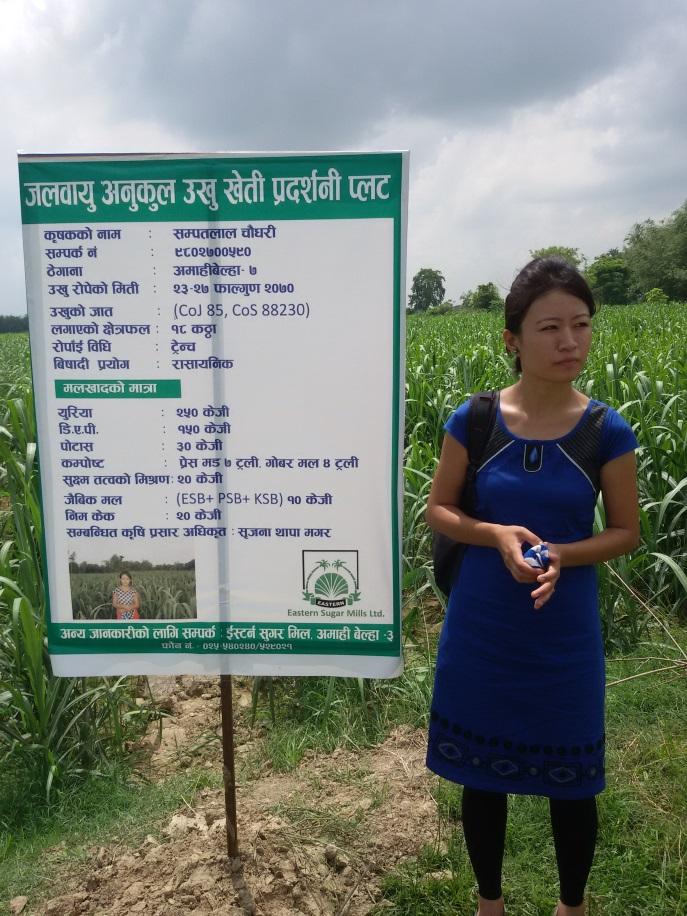
A demonstration plot in Sunsari district Nepal
Photo: Practical Action consulting Nepal
The project has realised that a combination of demonstration sites and training for farmers has a positive impact on the adoption rate of climate-smart agriculture among farmers and therefore uses the 'demo-and-training approach' to bring home this point. The extension agents of the project train farmers and also present to them the performance of crops on the demonstration sites. What farmers learn through the workshop trainings are immediately reflected in the practical sessions in the demonstration plots. Says one farmer who is part of the training:
The performance in demonstration plots is the key reason for the increase in curiosity among the farmers about the climate-smart agriculture practices. Farmers who initially withdrew from the training programs now ask me about the improved practice of cultivation and have rejoined the training programs.
In Nepal, about 70 percent of the agricultural labour is contributed by women. In order to ensure that both men and women farmers benefit from the trainings, the project team ensures that the trainings incorporate the specific challenges faced by men and women in dealing with climate change and adopting climate-smart agrirculture practices. When requested, women-only trainings are also conducted. On average, about 43 percent of the participants in the farmers’ training programme are women.
Beside the trainings and demonstration plots, the extension team constantly visits the farmers’ field to address any technical issues and farmers can also contact the project team for support.
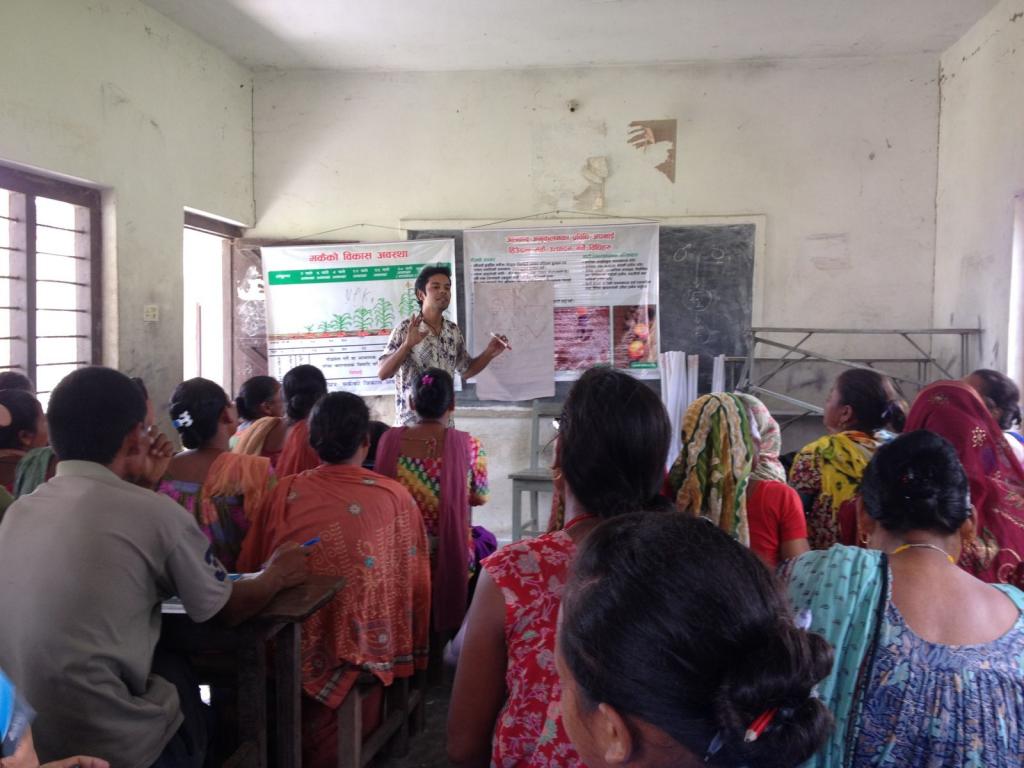
A Training session with farmers Bara district
in nepalPhoto: Practical Action consulting Nepal
Twenty more demonstration plots
This pilot project will establish 20 more demonstration plots for climate-smart interventions in maize crops in the beginning of the winter season. The next training sessions will be large-scale sessions aimed at farmers focusing on diverse socio-economic dimensions. The research team of the project will generate evidence of the benefits of climate-smart agriculture. The project will also focus on the promotion of carbon and energy smart practices in the pilot area.
Arun KC is Science Officer at CCAFS South Asia and Milan Joshi works at Practical Action Consulting, Nepal

